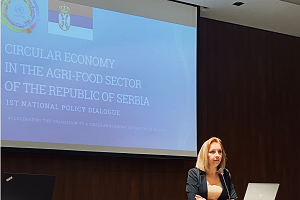July is a month to start enjoying the harvest of fruits and vegetables for many in Europe and the topic of reducing food loss and waste becomes very urgent. In Serbia, agriculture is an important sector of the economy, contributing around 6% of GDP. In March 2022 food production accounted for 10.4% of Serbian exports and amounted to 277.2 million USD – the largest exported product group of the country. Reducing food loss and waste in the management of the agricultural sector is therefore among the priorities of Serbia’s circular economy transition.
“Achieving a more circular economy and reducing food loss and waste will require integrated approaches, with cooperation between different sectors and raising awareness at all levels” said Ms. Sandra Dokic, Assistant Minister, Ministry of Environmental Protection, Republic of Serbia.
On 5 July 2022 the Ministry of the Environmental Protection of Serbia, with the support of UNECE, organized a national policy dialogue in Belgrade to facilitate the transition to a circular economy in the agricultural sector, with a focus on food loss and waste management. During the event, national stakeholders and international experts discussed and identified policy, regulatory and institutional limitations that hold back the circular economy transition in Serbia. The findings of the discussion will be summarized in national gap analysis, currently under development with UNECE support. The gap analysis will provide input to the preparation of a national action plan for circular economy transition in agriculture through food waste reduction and prevention – expected to be released by UNECE in 2023.
Serbia, as a UN Member State and an EU candidate country, is committed to the concept of a circular economy. The Road map for Circular Economy in Serbia is the principal document developed by the Ministry of Environmental Protection of the Republic of Serbia in 2021 to delineate the steps and timeline for the future circular evolution. The Strategy identifies the agriculture and food sector as one of the priority sectors to intensify the development of the circular economy. Further, Serbia’s national pathway for food systems transformation identifies food loss and waste reduction as key areas to ensure sustainable food systems.
The introduction of circular economy principles in the agri-food industry can help lower resource use and reduce the environmental footprint of the sector. According to UNDP, 770,000 tons of food is lost or wasted annually in Serbia, with 90% of the food waste ending up in landfills, contributing to GHG emissions. At the same time, the poorest households struggle to secure meals. Reducing food loss and waste can help address environmental and nutrition problems, while also being good for the economy.
Reducing food loss and waste is among the priorities for the work of UNECE, particularly the Working Party on Agricultural Quality Standards. In its recent intergovernmental meeting, the UNECE Specialized Section on Standardization of Fresh Fruit and Vegetables established a working group to review possibilities of adapting provisions of standards to further ensure they do not contribute to food loss and waste. On the technical level, UNECE has developed several tools that can support Serbia in the sound management of waste. This includes:
- the UNECE Code of Good practice for reducing food loss and ensuring optimum handling of fresh fruit and vegetables along the value chain, and a methodology for measuring food loss and waste along supply chains,
- the UN/CEFACT Transboundary Movements of Waste (TMW) project has been launched to establish a global standard for the electronic interchange of waste movement-related data (e-Basel),
- the UNECE Guidelines on Waste-to-Energy Public-Private Partnerships (PPPs).
The national policy dialogue in Belgrade brought together academia, NGOs, private sector, and international organizations (UNECE, UN Resident Coordinator Office in Serbia, UNDP, UNEP, and FAO) to ensure coherence of the support measures and maximize project impact.
The national policy dialogue is a part of the UNECE project “Accelerating the transition to a circular economy in the UNECE region”. Project outputs and deliverables will be presented and communicated via the UNECE stakeholder engagement platform CIRCULAR STEP to scale up and replicate successful circular practice in the UNECE region.
